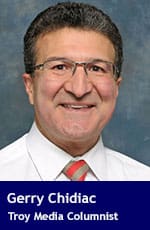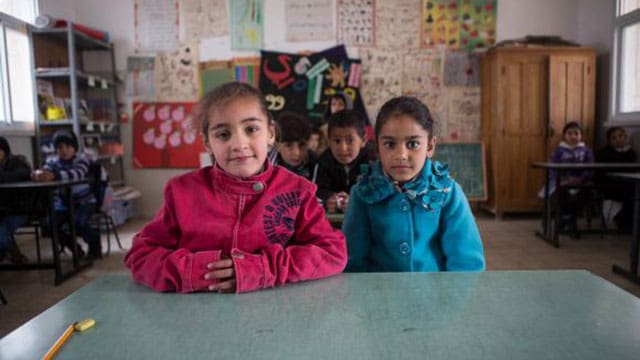Why both Israel and Palestinians must tackle biases in their education systems to pave the way for peace

For interview requests, click here
In a recent speech, former New York mayor Rudy Giuliani expressed a belief that some people seem to hold. He stated, “The Palestinians are taught to kill us (Americans and Israelis) at two years old!”
We live in a world of soundbites and clickbait. It’s why I encourage my students to be critical of what they hear and ask, “Is this true?”
Following my own advice, I sought information on the education system in Palestine. One of the foremost experts on this topic is Dr. Samira Alayan, a scholar at The Hebrew University of Jerusalem who has a deep understanding of education in conflict zones. While her research does not specifically examine preschool education in Palestine, it does provide valuable insight into elementary and high school curriculums.
 Image courtesy Defense for Children International |
| Recommended |
| How tensions in the Middle East ripple across the globe
|
| One year later, and the world is still divided over the Hamas-Israel war
|
| Israel demonized while Hezbollah war crimes ignored
|
Dr. Alayan’s research indicates that Palestinian textbooks aim to bolster students’ national identity, as is common in many educational systems. In earlier editions, these textbooks depicted the conflict with Zionism rather than Judaism as a religion, emphasizing that the struggle was against colonial and imperial influences. Judaism was presented in a neutral light, and maps depicted Israel within its 1967 borders. Importantly, Alayan noted the absence of explicit racism or calls for violence against Israelis.
Dr. Alayan’s perspective is shaped by her focus on how educational narratives contribute to identity formation in regions of conflict. While her work is critical of one-sided historical narratives, she acknowledges the efforts of Palestinian educators to frame their experiences under occupation without promoting direct incitement or hatred.
I also came across the work of Dr. Nurit Peled-Elhanan, a colleague of Dr. Alayan at The Hebrew University. Peled-Elhanan, the daughter of a prominent Israeli Army general who tragically lost her daughter in a 1997 suicide attack in Jerusalem, has become a powerful critic of Israeli educational practices. Her political perspective leans toward a strong critique of systemic biases in Israeli society. In her analysis, she asks a provocative question: “How do you educate children to kill other children?”
Dr. Peled-Elhanan’s research shows that Israeli textbooks often frame the country’s history to legitimize territorial control and justify the creation of the Israeli state. She notes that these textbooks emphasize Jewish rights to the land, rooted in historical antisemitism and the Holocaust, which is portrayed as a critical reason for maintaining control over the land.
However, Palestinians, according to Peled-Elhanan, are subject to symbolic, cultural, and physical erasure within these texts. They are depicted through dehumanizing stereotypes, often replaced by the generic term “Arab,” and their suffering under Israeli occupation is largely ignored. The absence of the term “Nakba” (catastrophe) from educational materials further illustrates this, framing acts against Palestinians as necessary measures and painting any retaliation as unprovoked terrorism.
Dr. Peled-Elhanan argues that such an educational approach fosters what she calls “elite racism,” where students are socialized into a belief that legitimizes the exclusion and demonization of the Palestinian people. Her critique aligns with her broader political stance, advocating for recognizing both sides’ histories to promote a more equitable and honest dialogue.
The Palestinian Authority changed textbooks in 2018 in reaction to the way Israel is teaching about Palestine. Alayan notes that while Israel is presented as an occupier, and discussions of Zionist occupation are included, Israeli maps are often omitted, and topics like the Holocaust are not covered. When asked about the absence of the Holocaust, Palestinian Authority representatives explained, “As long as they (the Israelis) do not mention our Nakba, we will not mention their Holocaust.” This reciprocal exclusion reflects the depth of mutual distrust and the political nature of education in conflict regions.
Although I found no evidence to substantiate Giuliani’s claim that Palestinian children are indoctrinated to kill Americans and Israelis, my research raises significant concerns about the education systems in both regions. The portrayal of the “other” in school textbooks can reinforce existing biases, perpetuating cycles of conflict rather than fostering understanding. Education should empower and liberate students while promoting respect for all humanity. Although educators cannot entirely remove their personal biases from teaching, education should strive to be as depoliticized as possible.
As Dr. Alayan suggests, both Israeli and Palestinian textbooks need to present all relevant historical facts, such as the Holocaust and the Nakba, allowing students to develop their own narratives and opinions. This approach is vital for nurturing critical thinking and fostering a more balanced view of history that could one day contribute to peace.
In conclusion, while Giuliani’s statement does not hold up to scrutiny, the educational systems on both sides reveal complex, politically influenced narratives that shape young minds in ways that can hinder mutual understanding. Addressing these issues through education reform that embraces historical honesty and respect for the “other” is essential for both societies.
Gerry Chidiac specializes in languages and genocide studies and works with at-risk students. He received an award from the Vancouver Holocaust Education Centre for excellence in teaching about the Holocaust.
Explore more on Israel, Gaza, Middle East
The views, opinions, and positions expressed by our columnists and contributors are solely their own and do not necessarily reflect those of our publication.
© Troy Media
Troy Media is committed to empowering Canadian community news outlets by providing independent, insightful analysis and commentary. Our mission is to support local media in building an informed and engaged public by delivering reliable content that strengthens community connections, enriches national conversations, and helps Canadians learn from and understand each other better.

